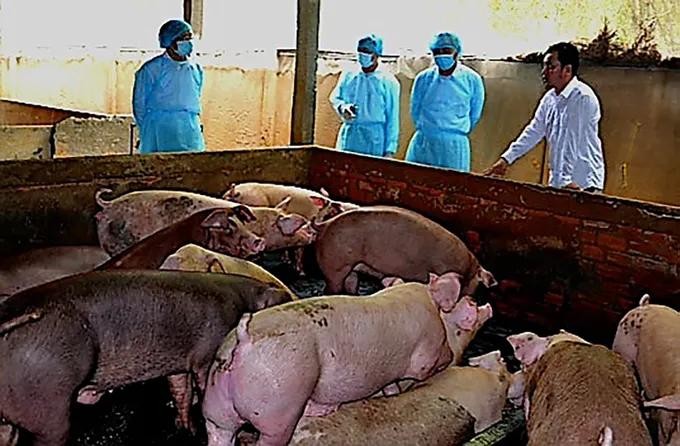
Breeders disinfect their livestock facilities and dispoe of infected pigs
African Swine Fever (ASF) is developing rapidly in the Mekong Delta, with new outbreaks appearing continuously. To contain the spread, reduce economic losses, and ensure food safety especially as the year-end approaches, local livestock authorities are working closely with grassroots governments and farming households to implement strong, comprehensive measures.
At his farm in Vinh Long Province’s Vinh Kim Commune, which houses nearly 100 pigs, breeder Nguyen Van Lam completes the task of spreading lime powder around the barns before proceeding to mix disinfectant and spray every corner of his facilities. He mentioned that his family undertakes the disinfection of the farm each morning to safeguard their herd against infection.
"With ASF spreading across numerous regions, I must exercise caution with every detail. All my savings from the previous year are invested in the pigs I intend to sell for Tet. If I am negligent and the pigs perish, I not only forfeit all my labor but could also potentially lose billions of Vietnamese dong," he stated.
Despite suffering hundreds of millions of dong in losses after more than 70 pigs died of ASF, Nguyen Thi Huyen Thanh in Tay Ninh Province’s Binh Duc Commune has continued working with local authorities and veterinary officers to isolate the outbreak, destroy all infected pigs, and thoroughly clean and disinfect her barns.
“When the disease first appeared, only about ten pigs showed symptoms while the rest were still eating normally. Some neighbors advised me to butcher them quickly to cut losses. But to protect food safety and prevent the disease from spreading, my family immediately notified veterinary authorities,” she recalled.
Across the Mekong Delta, thousands of pig-raising households, together with provincial veterinary forces, are implementing strict, urgent measures to stop the outbreak from expanding especially during the last months of the year. In Vinh Long Province, authorities have established 20 animal-health checkpoints on national and provincial highways leading into gateway communes such as Cau Ngang, Nhi Truong, Vinh Kim, and Long Hiep.
At the Long Hiep checkpoint, Deputy Director of the provincial Department of Agriculture and Environment Le Van Dong affirmed that checkpoints operate around the clock. All trucks carrying live pigs or pork products must present release permits, health certificates, and other required documents.
“The disease-control measures will be enforced strictly before, during, and after Lunar New Year 2026. Any individual or team that relaxes the checkpoint controls, allowing new outbreaks or spread, will be strictly disciplined,” he stated.
Control in border and cross-province zones is enhanced
According to Thai Hoang Nam, Deputy Head of the Animal Husbandry and Veterinary Sub-Department of An Giang Province, the unit is implementing a series of measures to prevent ASF from spreading further. These include ensuring sufficient disinfectant for farming households and market managers, who use it to sanitize barns and trading areas. At Vam Cong ferry connecting Dong Thap and An Giang provinces, the checkpoint has been instructed to tightly inspect all pig shipments, verify origin, and strictly penalize violations.
In border areas, Lieutenant Colonel Nguyen Tan Duong, Chief of the Ha Tien International Border Guard Station, said his force has increased patrols along trails, openings, and river mouths to monitor the movement of people, vehicles, pigs, and pork products. The goal is to promptly detect and prevent any smuggling of pigs or infected meat into Vietnam.
However, a major challenge, according to Dinh Thi Phuong Khanh, Deputy Director of the Department of Agriculture and Environment in Tay Ninh Province, some households still lack proper disease-prevention awareness. Some hide outbreaks, fail to report cases, or refuse to cooperate with authorities in containing and destroying infected pigs.
To address this, livestock authorities of Tay Ninh Province are working with commune governments and related agencies to intensify communication efforts, helping farmers clearly understand the consequences of ASF and encouraging them to cooperate fully. Local authorities are also considering stronger sanctions for those who deliberately conceal outbreaks.
Beyond immediate solutions including early detection, quarantine, and destruction of infected pig, livestock agencies are guiding farmers to shift production methods in ways that better prevent ASF outbreaks. The focus is on overcoming small-scale, fragmented farming practices and encouraging gradual transition to larger, closed-loop farm models that meet biosecurity standards.
Provinces are also promoting high-tech livestock applications, from controlled-environment barns to automated feeding and herd-management systems. Such innovations improve disease control, reduce risks, and enhance long-term sustainability for the livestock sector.
In the past three months, ASF outbreaks have surged across Mekong Delta provinces. In Tay Ninh Province alone, October 2025 recorded seven outbreaks across six communes and wards, with more than 150 pigs destroyed, totaling 9.6 tons. In Vinh Long Province, four communes have already declared outbreaks, while two others are classified as high-risk areas.
























